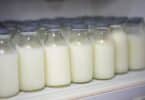First appearing in November of last year, COVID-19 is a new and potentially deadly virus. We have no idea how to protect against it, no proven drugs to treat it, and we are still learning about how it is transmitted from one person to another. Pressed for time but limited on study subjects, scientists are working hard to find the answers to all of our questions.
Researchers at the University of California San Diego School of Medicine are focused on finding the answers to three very critical questions:
Is COVID-19 transmittable to the infant during pregnancy?
Can COVID-19 be contracted via breastmilk?
Could breastmilk protect infants from COVID-19?
“Women and their health care providers need answers as quickly as possible regarding the effects of COVID-19 during pregnancy and while breastfeeding,” Christina Chambers, Ph.D., MPH, principal investigator, a professor in the Department of Pediatrics at UC San Diego School of Medicine and director of OTIS and MothertoBaby, said. “We know that pregnant and breastfeeding moms are contracting COVID-19, but the fact of the matter is that we know very little about its short-and long-term effects on a developing baby.”
For now, scientists are looking at past viruses and how they have impacted the maternal and infant populations.
“To date, there are only a few case reports of pregnancy outcomes following maternal infection with this new virus,” Chambers said. “However, prior research on respiratory infections, such as seasonal influenza, has indicated that pregnant women, in general, are at higher risk than non-pregnant women for complications from the infection, which in turn can lead to more common pregnancy complications, such as preterm delivery. In addition, a high fever early in pregnancy may pose a risk for the developing fetus, and women should discuss treatment options with their health care provider.”
UC San Diego’s Larsson-Rosenquist Foundation Mother-Milk-Infant Center of Research Excellence (MOMI CORE) is donating $100,000 in an expedited, streamlined process to get the study underway. Women who reside in Canada or the United States will be interviewed over the phone during their pregnancy and postpartum periods to determine if or how the virus impacts infant and maternal outcomes. Expectant mothers who come into contact with COVID-19 during the interview period (or before) will also be asked to enroll in the UC San Diego’s Hunan Milk Biorepository, a study that specifically focuses on determining if breastmilk can protect against or potentially transmit the virus.
“We already know breast milk contains properties that help protect infants from diseases, such as diarrhea and pulmonary infections. We urgently need to determine whether or not the virus is found in breast milk and discover breast milk components with antiviral properties that could protect infants from COVID-19,” says Lars Bode, PhD, principal investigator and director of UC San Diego’s Larsson-Rosenquist Foundation Mother-Milk-Infant Center of Research Excellence.
“We hope pregnant and breastfeeding women see the importance in helping the world understand this novel virus and consider volunteering for the study. There is much to be learned in a short period of time that can help women who are currently or may become pregnant or breastfeed,” said Chambers, director of clinical research for the Department of Pediatrics.







